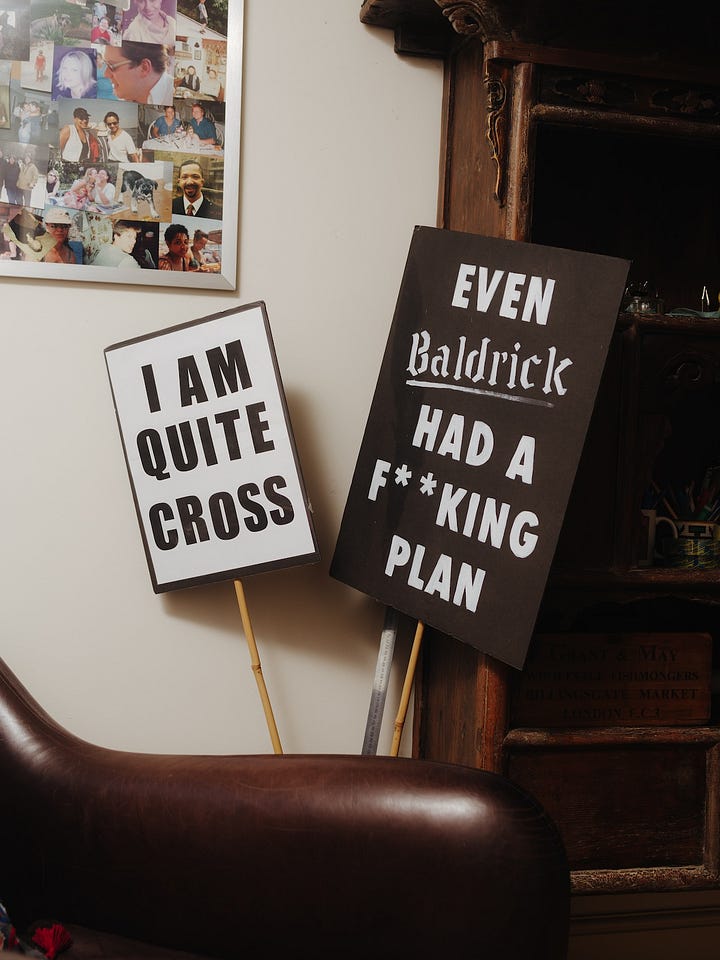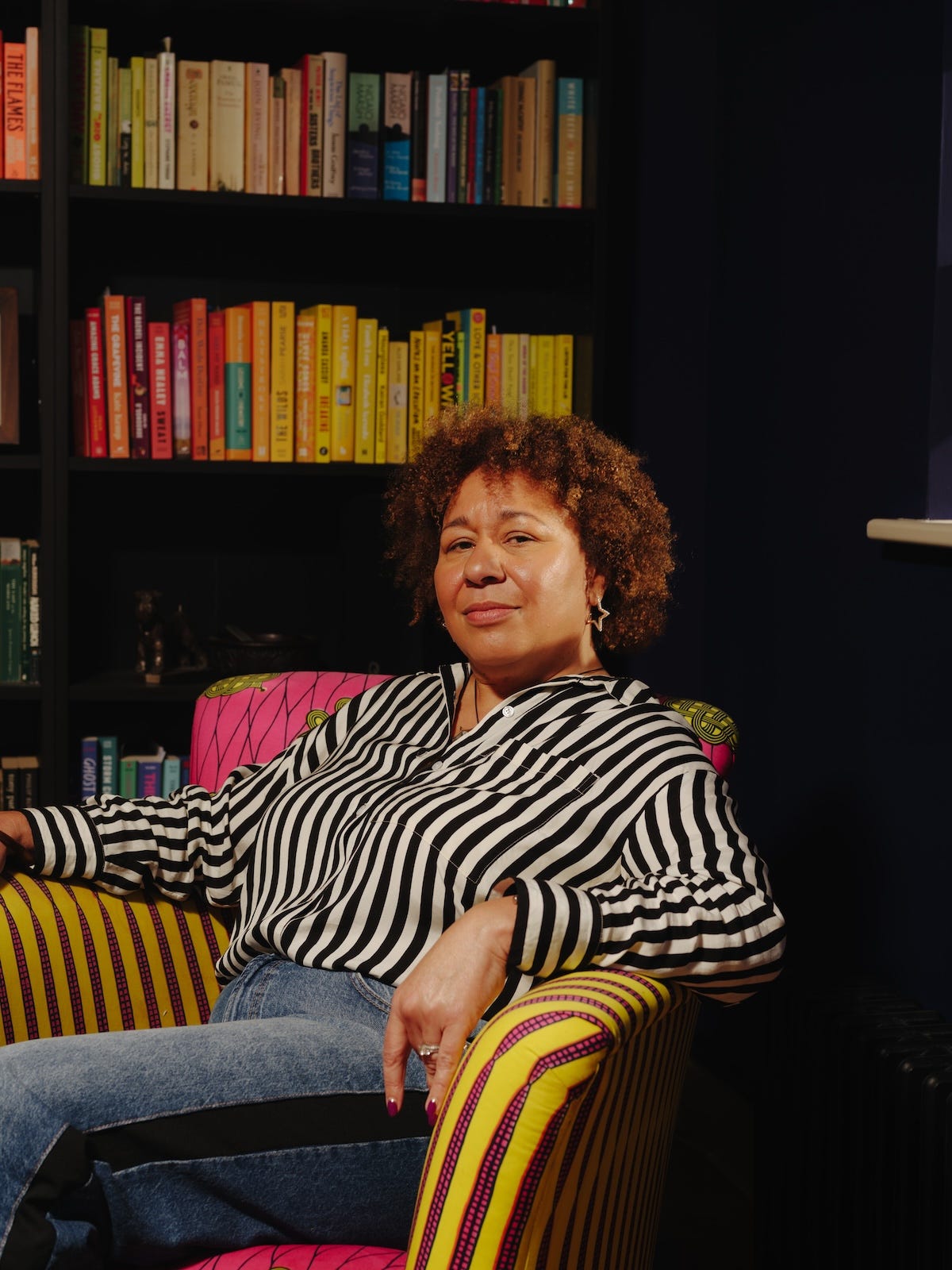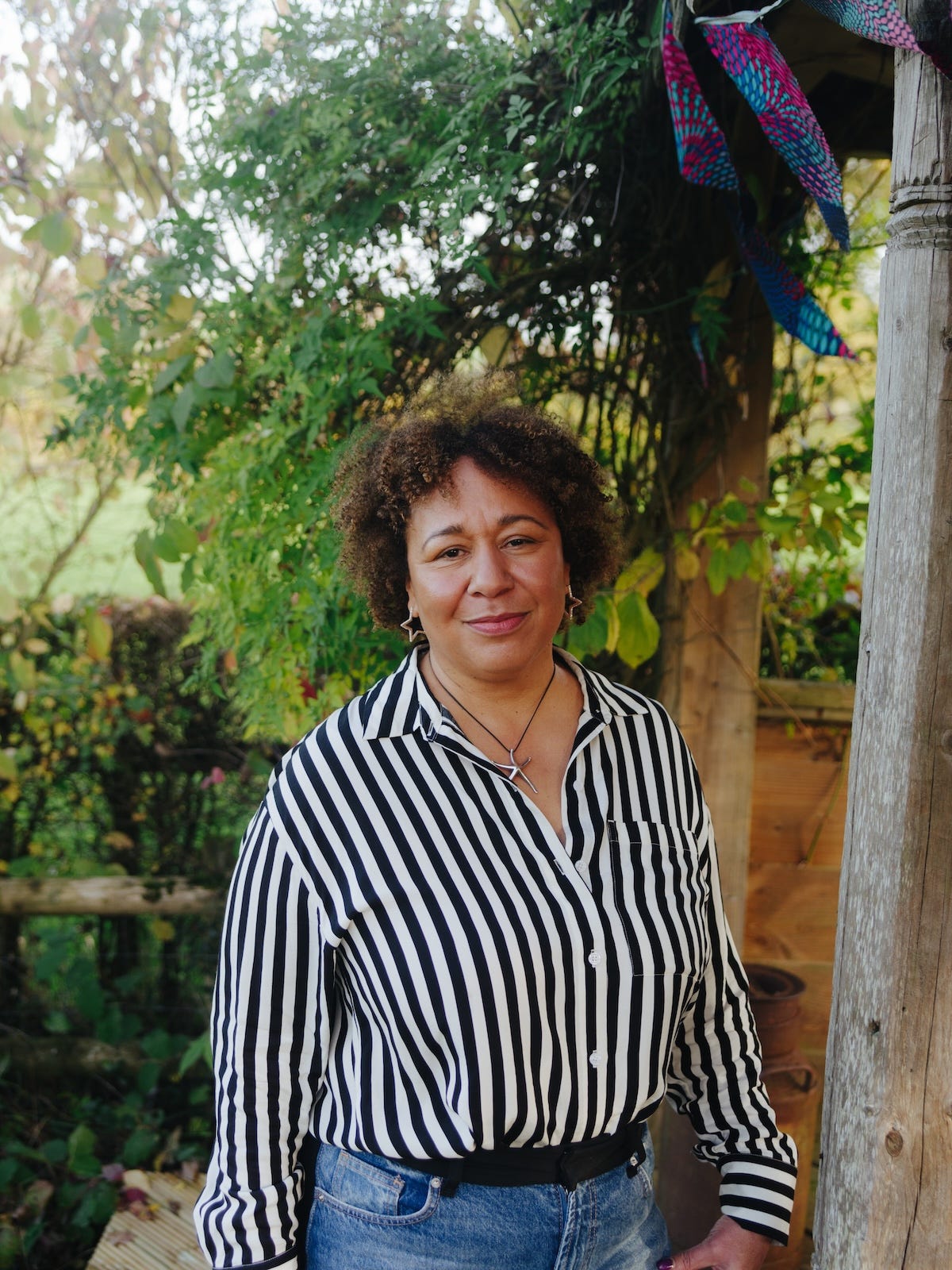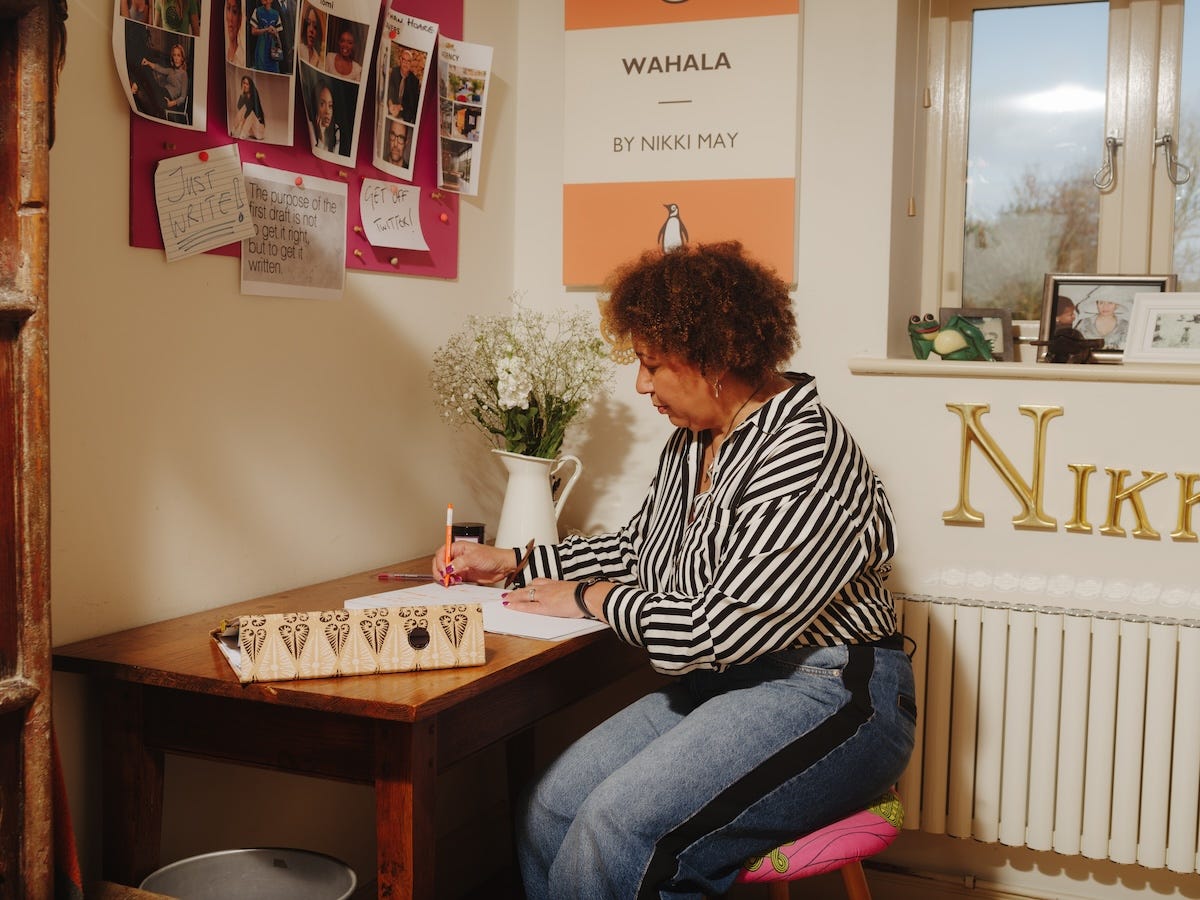Bookmarked with Nikki May
“I’ve been known to go to bed at 7 p.m. just to dive into a good book.”
This email is long and may be cut off. You can view the web version here.
Welcome to a new installment of Bookmarked, a series at Downtime where our favorite authors and readers share their best book recommendations, reading rituals, and behind-the-scenes stories. Today, Alisha chats with Dorset-based author Nikki May about her latest novel, THIS MOTHERLESS LAND.
I’ll start with a confession: This Motherless Land by Nikki May is one of my favorite reads this year. The book is a reimagining of Mansfield Park by Jane Austen, set between London and Lagos, and it adds something necessary and nuanced for our current world. It’s not only a story class, but also race, privilege, friendship, identity, love, and belonging. I could hardly put it down.
You may already know Nikki from her debut novel, Wahala, a sharp and funny exploration of female friendship (that’s soon to be adapted into a major BBC series!). With This Motherless Land, she delivers yet another masterful story, full of wit, heart, and unforgettable characters.
I’m convinced that by the end of this interview, you’ll be so charmed by Nikki’s humor and insight that her book(s) will shoot straight to the top of your to-read pile. Her sparkling, engaging voice shines throughout the novel, and as you’ll see, it’s just as delightful in conversation. Enjoy!
P.S. I’m thrilled to share that this is the first Bookmarked to feature stunning, original photography shot exclusively for Downtime. This has been a dream of mine—to elevate our author interviews with visuals as captivating as their stories. You can expect to see more of this in 2025. All photos here were taken by Dan Wilton.
Upgrades like this are possible thanks to paid subscribers—thank you for your support! If you’d like to help bring more of this to Downtime in 2025, you can sign up here. I hope you love the photography as much as I do.
Get to Know Nikki May, Author of “This Motherless Land”

Hello, Nikki! For readers who aren’t familiar, how would you describe This Motherless Land in your own words?
This Motherless Land is a deeply personal novel about identity, belonging, culture, and the meaning of home. Spanning two decades and crossing continents, it tells the story of two extraordinary cousins, Funke and Liv, as they navigate love, loss, and the shadows of their mothers’ choices.
When Funke’s mother dies in a tragic accident in Lagos, she’s sent to England to live with her maternal family. She finds the food tasteless, the weather gray, and her relatives aloof—except for her cousin Liv. Free-spirited Liv, desperate to escape her joyless family, finally finds an ally in Funke. The two give each other what they need most: love.
But the past casts long shadows, and their mothers’ choices shape their adult lives in profound ways. At its heart, this is a story about both of my homes—and how privilege and prejudice are, unfortunately, universal.
What inspired This Motherless Land, and how did you decide it would be a Mansfield Park retelling? Is that your favorite Austen?
My story is inspired by my life. Born in Bristol, I moved to Lagos before I was one, and then to London at twenty. Shifting between cultures and code-switching to fit in made me obsessed with identity. I always knew I’d write about these themes, but reading Mansfield Park for the umpteenth time gave me my 'aha!' moment. The idea of a girl ripped from her home and thrust into an alien world where she must constantly prove herself was irresistible—I had to explore it through my lens.
I’ve always been a Janeite. Austen’s observations of people, relationships, and societal pretensions are unmatched. Mansfield Park is underrated—possibly her most complex novel. Fanny is often dismissed as insipid, but she had no choice; she was poor and had to be meek and grateful. I also wanted to decolonialize the story. The Bertrams’ wealth was built on slavery, yet no Black people appear in the book. It felt like the right time to turn that on its head.
Retellings can take many forms—what was your approach, and did you face any unexpected challenges?
My story is a reimagining, not a direct retelling. I used Mansfield Park as scaffolding to build a very different, personal story.
Once I decided on this direction, I put Mansfield Park back on the shelf—I didn’t want to feel constrained by the text. Some elements are close to the original, like Margot, my Mrs. Norris, who is Jane’s only thoroughly wicked character.
Initially, I considered making Jojo the Edmund character and pairing him with Funke, but my editor was right to veto that. Cousin romances worked in Georgian times, but they’d give modern readers the ick! Besides, I find female bonds much more compelling to write about than romantic ones.
How did your experiences shape this novel?
This Motherless Land isn’t a memoir, but parts of it are deeply personal. Funke’s childhood mirrors my own—riding my green Chopper, living in my Lagos house, and even her mother teaching art at school. But it’s still fiction! My mom is alive, well, and doing yoga with me every Tuesday.
Writing about race, class, and identity demands authenticity, and my experiences with both prejudice and privilege shaped this story. My maternal grandparents disapproved of me and my siblings because our father was Black. Yet I also had a privileged, middle-class upbringing, and being light-skinned gave me advantages in both my homes. These nuances of belonging—never feeling wholly one thing or the other—are central to the story.
Which character’s voice came most naturally to you? Which was the most challenging?
Funke came to me fully formed—her resilience, introversion, and mixed-race experience felt natural to write. I understand what it’s like to belong to two cultures and also belong nowhere. From the start, I knew she was the best of them, and I felt awful for making her life so difficult. But that’s my job as a writer: throw trouble at your characters and see if they sink or swim.
Liv was harder. Privilege can be an unlikeable trait, but over two years, I grew to love her complexity. She makes one devastating mistake and pays a heavy price for it. Privilege can be a burden, and no one wants to own up to having it. In the end, I came out thinking it’s better to have a wonderful mother who’s dead than a terrible mother who’s alive.
Why did you choose to center Funke and Liv’s relationship?
I’m obsessed with stories about female friendships—they’re rich, layered, and endlessly interesting. Shared history is incredibly valuable; there’s something comforting about not needing to explain backstory.
Initially, I thought I was writing Funke’s story, but characters have a way of surprising you. By the end of the first draft, it was clear this was about two women intrinsically tied by love and history. Their bond is the heart of the story.
Without giving too much away, how did you decide on the story’s resolution?
Thank you—I sobbed while writing that last scene! I originally planned for The Ring to burn to the ground, but when the time came, I couldn’t do it. I guess I’m a romantic at heart. [Editor’s note: “The Ring” is the name of the family’s estate.]
The ending is also a homage to Jane Austen—every one of her novels concludes with a sense of resolution, and that felt fitting here.
Are there retellings or adaptations of Austen—or other classics—you particularly admire?
I’m obsessed with the BBC Pride & Prejudice adaptation starring Jennifer Ehle and Colin Firth. I binge-watch it at least twice a year! For modern adaptations, Bridget Jones's Diary by Helen Fielding is unbeatable. I also adore Miss Austen Investigates by Jessica Bull—it’s pure joy, and I can’t wait for the follow-up.
What do you hope readers take away from This Motherless Land?
I explore weighty themes like race, greed, and culture, but I set out to entertain, not preach. I want readers to race through the pages, to laugh, gasp, or cry—ideally all three.
Deep down, I hope it makes readers think about how much we share as humans. Melanin isn’t a character trait. If this story makes even one person reflect on the absurdity of prejudice or recognize their own privilege, I’ll be thrilled.
On Her Writing Process and Routines
When starting a new novel, do you begin with characters, setting, a theme—or something else entirely?
Characters and setting, always together. I don’t worry about plot or theme until I’ve figured out who and where.
And because I’m a lazy writer, it’s always a setting I’m familiar with. I like to put my characters in places and times I know well—it lets me focus my creative energy on their motivations and personalities rather than the finer details of their surroundings.
Right now, I’m working on book three. It’s set in an advertising agency (I worked in advertising for 30 years), and I’ve got three strong, spiky women taking shape in my head. The best part? Re-watching all ninety-two episodes of Mad Men and calling it research. I love this phase of the process!
What does your typical writing day look like?
My best ideas come on dog walks, so my ninety-minute morning walk with my Standard Schnauzers, Fela and Lola, is the most important part of my day. Rain or shine (and I live in South West England, so it’s mostly rain), we head out. They stop to stare at squirrels; I stop to send myself plot voice notes.
Back home, I seal myself in my office with an iced coffee and aim for my 2,000-word target. I’m a morning person, so by 2 p.m., my brain is fried. I have to write in complete silence—my poor husband knows even his breathing can throw me off!
When I’m drafting, I try to write at least four days a week, but life happens, and you can’t force creativity. I’ll admit I’m also a master procrastinator!


Do you have any advice, go-to rituals, or routines for getting past creative blocks?
A wise author once told me, “Your muse is your bitch. She works for you.” She doesn’t get to decide when to show up—you’re in charge. It doesn’t always work, but I try to sit at my desk for three hours every day when I’m drafting. Some days are brilliant; others, not so much.
Distractions are the enemy, so I’ve pinned a note above my desk that says: STAY OFF SOCIAL MEDIA. Unfortunately, I don’t follow my own advice as much as I should!
I’m goal-oriented, so I use a chart with daily word count targets and love ticking them off. My biggest tip is just to keep going—don’t let perfection be the enemy of good. When I get stuck, I leave a placeholder in red type: “THIS IS CRAP! COME BACK AND FIX IT LATER.” Then I move on. The real work begins in the editing stage, and until you’ve got a complete draft, there’s nothing to edit.
Nikki’s Reading Rituals
What does your reading routine look like?
I’ve had insomnia most of my life, so I’m a nighttime reader. I’ve even been known to head to bed at 7 p.m. just to dive into a good book. My favorite setup is reading in bed, snuggled under the covers in complete silence—except for the occasional snores from my dog.
What's your ideal reading setup?
The only thing better than reading in bed is reading on holiday. Put me on a sun lounger by a turquoise pool with a slushy margarita in one hand and a bowl of salty popcorn in the other. And don’t forget to top up my glass every so often!
Do you have a favorite independent bookstore?
Right now, it’s Liz’s Book Bar in Brooklyn, NYC. It’s the perfect combination—a bookshop and a wine bar. I was lucky enough to have my book launch there in November, and it made me want to move to New York!
How or where do you discover new books to read?
Word of mouth is my go-to. I’m in three book clubs, which keeps me busy, and my mum and I swap books constantly. Bookstagram is terrible for my bank balance—it always convinces me I need another book. Plus, I often get sent advanced copies of upcoming titles. All of this adds up to a completely out-of-control TBR pile!
Nikki’s Book Recommendations
Nikki’s must-reads include some modern classics, a true British classic, and a few new titles to put on your radar.
Paid subscribers of Downtime can see the rest of this post. Join in for $5/month here to unlock this section and other bonus content each month.
Keep reading with a 7-day free trial
Subscribe to Downtime to keep reading this post and get 7 days of free access to the full post archives.
















